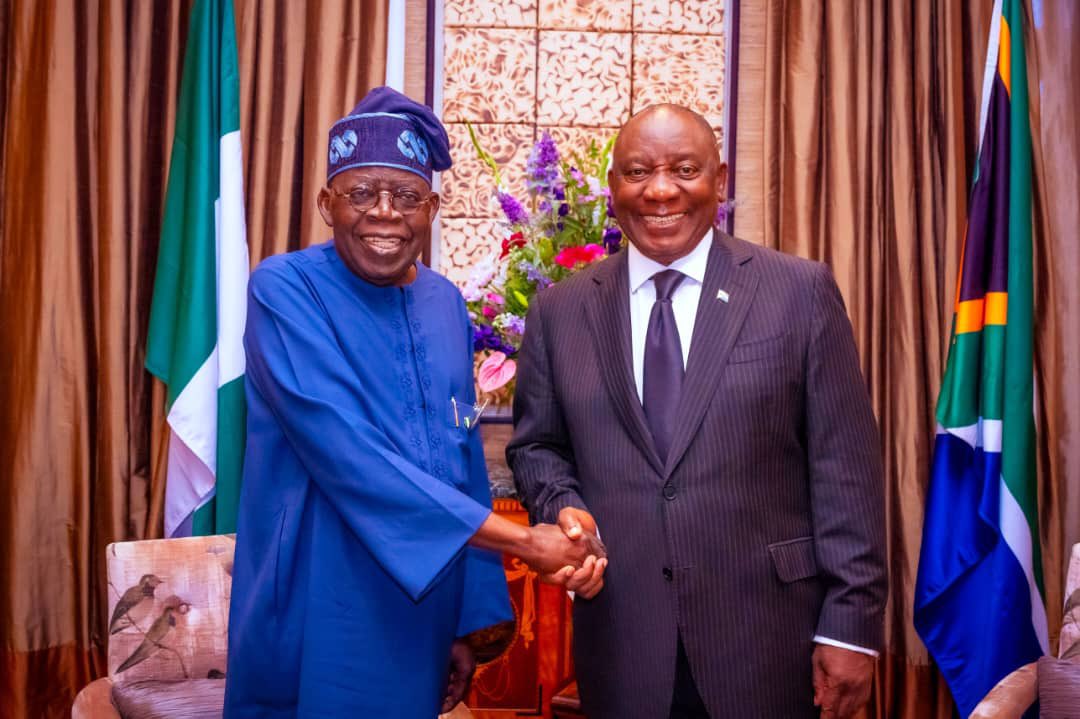President Ramaphosa Advocates Nigeria-South Africa Collaboration on Critical Minerals, G20 Membership

President Cyril Ramaphosa has called for strengthened collaboration between Nigeria and South Africa to harness critical minerals, particularly lithium, as both nations position themselves at the forefront of the global green energy transition.
Speaking on Tuesday at the Nigeria-South Africa Business Roundtable, Ramaphosa underscored the potential of Nigeria’s vast lithium reserves to drive industrialisation within the electric vehicle (EV) battery sector.
Highlighting the significance of private sector involvement, Ramaphosa stated, “There is much opportunity for cooperation on pharmaceuticals. Our two countries are strategically positioned to benefit from the rapid growth of clean energy manufacturing industries.”
He further elaborated on South Africa’s initiatives, noting, “South Africa has developed a Just Transition Framework and an Investment Plan that anticipates massive investments in renewable energy and the green economy over the next few years.
As part of the broader global transition to a low-carbon economy, we must leverage the abundant natural resources that exist in our countries to promote green industrialisation.”
Ramaphosa called on businesses in both nations to support mineral beneficiation at the source and enhance capabilities in processing critical minerals, essential for scaling up manufacturing infrastructure for green energy projects.
Reaffirming South Africa’s commitment to Nigeria’s bid for G20 membership, President Ramaphosa described Nigeria as “a valued sister country.”
He reiterated this stance during bilateral talks with President Bola Tinubu and at the launch of South Africa’s G20 presidency in Cape Town.
“South Africa and the African Union are the continent’s only representatives in the G20. Other key African countries should also be admitted to the club so that we can amplify Africa’s voice,” Ramaphosa asserted.
He credited South Africa’s efforts for the African Union’s recent G20 admission, which he hailed as a milestone in ensuring Africa’s growing influence in global affairs.
President Ramaphosa announced significant strides in facilitating travel for Nigerian citizens. He revealed that Nigerian tourists can now apply for South African visas without submitting their passports, with qualifying businesspersons and tourists eligible for a five-year multiple-entry visa.
“Our efforts to create a favourable environment include simplifying visa processes for Nigerian business people to travel to South Africa. Qualifying applicants can now obtain a five-year multiple-entry visa,” he said.
Addressing longstanding concerns, Ramaphosa pledged to tackle barriers to investment and challenges faced by businesses in both countries.
“Nigeria is host to several South African companies, and South Africa has always welcomed Nigerian businesses. However, there is more to do in removing constraints to investment and addressing challenges faced by companies on both sides,” he said.
The two nations also agreed to finalise the five-year-old Memorandum of Understanding (MoU) on the Early Warning Mechanism to curb violence, criminality, and reprisals involving their citizens.
The agreement was part of discussions at the 11th session of the Nigeria-South Africa Bi-National Commission (BNC), held in Cape Town.
South Africa’s Minister of International Relations and Cooperation, Ronald Lamola, confirmed that the MoU would be signed by March 2025 during his visit to Nigeria for political consultations.
The session underscored the growing cooperation between Africa’s largest economies as they seek to deepen ties and leverage their strategic resources for mutual benefit.







